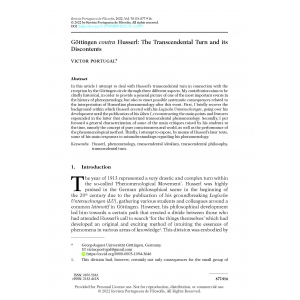Avé-Lallemant, Eberhard. “Die Antithese Freiburg-München in der Geschichte der Phänomenologie”. In Die Münchener Phänomenologie, edited by Helmut Kuhn, Eberhard Avé-Lallemant and Reinhold Gladiator, 19-38. Den Haag: Martinus Nijhoff, 1975.
Baring, Edward. Converts to Real: Catholicism and the Making of Continental Philosophy. Cambridge: Harvard University Press, 2019.
Bello, Angela Ales. “The Controversy about the Existence of the World in Edmund Husserl’s Phenomenological School: A. Reinach, R. Ingarden, H. Conrad-Martius, E. Stein”. In Does the World Exist?, edited by Anna-Teresa Tymieniecka, 97-115. Dordrecht: Springer, 2004.
Bernet, Rudolf., Kern, Iso and Marbach, Eduard. Edmund Husserl: Darstellung seines Denkens. Hamburg: Meiner, 1996.
Biemel, Walter. “Die Entscheidenden Phasen Der Entfaltung von Husserls Philosophie.” Zeitschrift Für Philosophische Forschung 13, no. 2 (1959): 187–213.
Boehm, Rudolf. Vom Gesichtspunkt der Phänomenologie. Den Haag: Martinus Nijhoff, 1968.
Cobb-Stevens, Richard. “Husserl’s Transcendental Turn”. In Husserl and Analytic Philosophy, edited by Richard Cobb-Stevens, 162-181. Dordrecht: Springer, 1990.
Conrad-Martius, Hedwig. “Zur Ontologie und Erscheinungslehre der realen Außenwelt”, Jahrbuch für Philosophie und phänomenologische Forschung, (Halle: Verlag von Max Niemeyer, 1916.
Conrad-Martius, Hedwig. “Die transzendentale und die ontologische Phänomenologie”. In Edmund Husserl: 1859-1959, edited by Jacques Taminiaux. Den Haag: Martinus Nijhoff, 1959.
Conrad-Martius, Hedwig. “Phenomenology and Speculation,” Philosophy Today 3, no. 1 (Spring 1959):
De Palma, Vittorio. Ist Husserls Phänomenologie ein transzendentaler Idealismus?” Husserl Studies, 21, (2005): 183-206.
De Warren, Nicolas. Ideen zu einer reinen Phänomenologie und phänomenologischer Philosophie. In Husserl-Handbuch: Leben-Werk-Wirkung, edited by Sebastian Luft & Maren Wehrle, 65-74. Stuttgart: Metzler, 2017.
Husserl, Edmund. Philosophie als strenge Wissenschaft”. Logos: Internationale Zeitschrift für Philosophie der Kultur, 3, no. 1, (1911):
Husserl, Edmund. Cartesianische Meditationen und Parise Vorträge. Edited by Stephan Strasser. Den Haag: Martinus Nijhoff, 1950. (Husserliana I). English trans. by Dorion Cairns, Cartesian Meditations: An Introduction to Phenomenology, (Den Haag, Martinus Nijhoff, 1960)
Husserl, Edmund. Die Idee der Phänomenologie: Fünf Vorlesungen. Edited by Walter Biemel. Den Haag: Martinus Nijhoff, 1950. (Husserliana II). English trans. by Lee Hardy, The Idea of Phenomenology, (Dordrecht: Kluwer Academic Publishers, 1999).
Husserl, Edmund. Ideen zu einer reinen Phänomenologie und phänomenologischen Philosophie: Allgemeine Einführung in die Phänomenologie. Edited by Karl Schuhmann. Den Haag: Martinus Nijhoff, 1976. (Husserliana III). English trans. by Daniel Dahlstrom, Ideas for a Pure Phenomenology and Phenomenological Philosophy, (Indianapolis: Hackett Publishing: 2014)
Husserl, Edmund. Ideen zu einer reinen Phänomenologie und phänomenologischen Philosophie III: Die Phänomenologie und die Fundamente der Wissenschaft. Edited by Marly Biemel. Den Haag: Martinus Nijhoff, 1952. (Husserliana V). English transl. by William Boyce Gibson, Ideas: General Introduction to Phenomenology, (New York: MacMillan, 1931
Husserl, Edmund. Die Krisis der europäischen Wissenschaften und die transzendentale Phänomenologie. Edited by Walter Biemel. Den Haag: Martinus Nijhoff, 1954. (Husserliana VI). English trans. by David Carr, The Crisis of the European Sciences and Transcendental Phenomenology: an Introduction to Phenomenology” (Evanston: Northwestern University Press, 190),
Husserl, Edmund. Logische Untersuchungen. Erster Band: Prolegomena zur reinen Logik. Edited by Elmar Holenstein. Den Haag: Martinus Nijhoff, 1975. (Husserliana XVIII).
Husserl, Edmund. Logische Untersuchungen. Zweiter Band – I. Teil: Untersuchungen zur Phänomenologie und Theorie der Erkenntnis. Edited by Samuel Ijsseling. Den Haag: Martinus Nijhoff, 1984. (Husserliana XIX/1).
Husserl, Edmund. Logische Untersuchungen. Zweiter Band – II. Teil: Untersuchungen zur Phänomenologie und Theorie der Erkenntnis. Edited by Samuel Ijsseling. Den Haag: Martinus Nijhoff, 1984. (Husserliana XIX/2)
Husserl, Edmund. Einleitung in die Logik und Erkenntnistheorie Vorlesungen 1906/07. Edited by Ulrich Melle. Den Haag: Martinus Nijhoff, 1984. (Hua XXIV)
Husserl, Edmund. Briefwechsel III: Die Göttinger Schule. Dordrecht: Kluwer, 1994.
Husserl, Edmund. Briefwechsel V: Die Neukantianer. Dordrecht: Kluwer, 1994.
Ingarden, Roman. “Meine Erinnerungen an Edmund Husserl”. In Briefe an Ingarden, edited by Roman Ingarden, 106-135. Den Haag, Martinus Nijhoff, 1968.
Ingarden, Roman. Gesammelte Werke Bd. V: Schriften zur Phänomenologie Edmund Husserls. Tübingen: Max Niemeyer Verlag, 1998.
Jansen, Julia. “Taking a Transcendental Stance: Anti-Representationalism and Direct Realism in Kant and Husserl”. In Husserl und die klassische deutsche Philosophie, edited by. Faustino Fabbianelli & Sebastian Luft, 79-92. Dordrecht: Springer, 2014.
Keirby, A. C. S., “Husserl’s Transcendental Turn”. Journal of the British Society for Phenomenology, 28, no. 2, (May, 1997), 204-2015.
Kern, Iso. Husserl und Kant: Eine Untersuchung über Husserls Verhältnis zu Kant und zum Neukantianismus. Den Haag: Martinus Nijhoff, 1964.
Landgrebe, Ludwig. Der Weg der Phänomenologie: Das Problem einer ursprünglichen Erfahrung. München: Gütersloher Verlagshaus Gerd Mohn.
Mohanty, Jitendra Nath. “The Development of Husserl’s Thought”. In The Cambridge Companion to Husserl, edited by Barry Smith and David Woodruff Smith, 45-77. Cambridge: Cambridge University Press, 1995.
Moran, Dermot. “Making Sense: Husserl’s Phenomenology as Transcendental Idealism”. In From Kant to Davidson: Philosophy and the Idea of the Transcendental, edited by Jeff Malpas, 48-74. London: Routledge, 2013.
Moran, Dermot & Parker, Rodney. “Editor’s Introduction: Resurrecting the Phenomenological Movement”. Studia Phaenomenologica, 15, (2015)
Plessner, Helmuth. Gesammelte Schriften IX: Schriften zur Philosophie. Berlin: Suhrkamp, 1985.
Pradelle, Dominique. “Husserls Kritik an Kants Transzendentalen Idealismus: Erörterung des phänomenologischen Idealismus, Horizon: Studies in Phenomenology, 4, no. 2, (2015), 25-53
Reinach, Adolf. Was ist Phänomenologie. München: Kösel-Verlag, 1951. English transl. by Dallas Willard, “Concerning Phenomenology”. The Personalist, 50, no. 2, (1969), 220.
Schapp, Wilhelm. “Erinnerungen an Edmund Husserl”, in Phänomenologie 1959: 12–25.
Scheler, Max., Husserl, Edmund., Pfänder, Alexander, Geiger, Moritz and Reinach, Adolf. “Vorwort”, Jahrbuch für Philosophie und phänomenologische Forschung, (Halle: Verlag von Max Niemeyer, 1913)
Scheler, Max. “Idealismus-Realismus”, Philosophischer Anzeiger, no. 2 (1927), 282.
Schnell, Alexander. “Phenomenology and German Idealism”. In Oxford Handbook of the History of Phenomenology, edited by Dan Zahavi, 68-86. Oxford: Oxford University Press, 2018.
Schuhmann, Karl. Husserl-Chronik. Berlin: Springer 1977.
Smith, Barry., & Woodruff Smith, David. Introduction. In The Cambridge Companion to Husserl, edited by Barry Smith and David Woodruff Smith, 1-44. Cambridge: Cambridge University Press, 1995.
Smith, Barry. “Realistic Phenomenology”. In Encyclopedia of Phenomenology, edited by Lester Embree, 586-590. Berlin: Springer Science & Business Media, 1997.
Spiegelberg, Herbert. The Phenomenological Movement. Den Haag: Martinus Nijhoff, 1969.
Stein, Edith. Aus dem Leben einer jüdischen Familie. Louvain: Nauwelaerts, 1965.
Stein, Edith. Einführung in die Philosophie. Freiburg: Herder, 2010.
Von Hildebrand, Dietrich. What is Philosophy? Chicago: Franciscan Herald Press, 1973.
Welton, Donn. “The Systematicity of Husserl’s Transcendental Philosophy: From Static to Genetic Method”. In The New Husserl: A Critical Reader, edited by Donn Welton, 255-289. Indiana: Indiana University Press, 2003
Zahavi, Dan. “Husserl and the Transcendental”. In The Transcendental Turn, edited by Sebastian Gardner and Matthew Grist, 228-243. Oxford: Oxford University Press, 2015.
Zahavi, Dan. Husserl’s Legacy: Phenomenology, Metaphysics and Transcendental Philosophy. Oxford: Oxford University Press, 2018.









